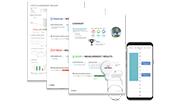
January’s can be tough. With the excess of December in the rearview mirror, the first month of the year can sometimes feel like a drag. Add in claims about ‘Blue Monday’ – supposedly ‘the most depressing day of the year’ – and you’ve got a recipe for the January Blues where our well-being and health can suffer.
But is January getting a bad rap? Can we find some positives when it comes to the black sheep of the Gregorian calendar? Firstbeat’s global measurement database seems to offer a silver lining.
The Firstbeat database is a collection of hundreds of thousands of hours of measurement data from around the world compiled from users of Firstbeat measurements. The anonymized data reveals insights into sleep, recovery, stress, and exercise. Comparing data from January 2018 to the mean average result for 2018 suggests the start of the year can actually be a positive time when it comes to replenishing our resources and, therefore, aiding our well-being for the months ahead.

Daytime Stress
Stress, and how we cope with it, has a big impact on our well-being. And you might think that January is a particularly stressful time for a lot of us as we leave behind lie-ins and extended family time for a return to work and the pressures of daily life.
However, the Firstbeat database found that the portion of stress encountered by users during January was generally lower per day than during any other month of the year. Perhaps, with people swapping Christmas drinks for dry January and nights in front of the tv, the year’s first month provides more time for relaxation and recovery than we think.
Sleep and Recovery
Sleep’s role in overall health and well-being cannot be underestimated. It is when the body replenishes its energy stores for the day ahead. Getting insufficient amount, and quality, of sleep can have serious implications on everything from health and longevity to cognitive functions like decision-making and alertness.

Firstbeat data revealed that Lifestyle Assessment users got, on average, 7.7 hours of sleep each night in 2018 – a figure that falls within the 7-9-hour range recommended by the National Sleep Foundation of the United States. And, perhaps surprisingly given the negative connotations surrounding the month, January data actually showed a slight increase on the year average.
Of course, just because you are asleep that doesn’t mean that your body is recovering. Sleeping longer doesn’t automatically mean you recovery more while catching some Z’s. Drinking alcohol or exercising close to bedtime can delay the onset of overnight recovery, while different sleep states produce different levels of recovery.
Firstbeat’s unique heart rate variability analysis of a person’s physiology provides a more in-depth view of when, and how much, recovery is taking place during sleep. And, once again, the data for January 2018 makes interesting reading compared to the year’s average. Per Firstbeat’s database, users were in a state of recovery for over 10 minutes longer during sleep in January 2018 than the average for 2018.
Read more about heart rate variability
And the positive recovery trend is apparent during the daytime, too. Although not as pronounced as overnight recovery, the data showed January was once again top of the pile when it came to daytime recovery.
How We Feel
Of course, the data is only one side of the story. How we subjectively feel about our own situation is important to acknowledge, too. Before beginning a Firstbeat measurement, users are asked to rank themselves from 1-5 in response to the statement, ‘I generally feel stressed’.

You might expect to see January as amongst the most stressful months in terms of subjective user feedback. But the data showed that only four months in the year produced a lower self-ranked stress score. Three of the months with lower scores were July, August, and September, respectively – the time of year when people are traditionally enjoying summer holidays and (fingers crossed) better weather which can have a positive impact on perceived stress.
Look for the Positives
Everyone is different. The data collected and described above doesn’t mean that everyone enjoys more restorative sleep during January, or typically encounters fewer periods of stress during the day. Nevertheless, it does point to some positives in a month that people typically wish they could fast forward through.
Try to seek out the positives during the first few weeks of the year and, whilst you’re adjusting to your typical routine, you might discover some tips and techniques that leave you feeling a little bit more recovered and relaxed. Keep these in mind and you can help fight off those January Blues.
You might also be interested in

The Dose Makes the Medicine – Moderate Physical Activity Improves Mental Health
Regular exercise is good for you body and mind. However, more training isn’t always better and exercising too much might have a negative impact on mental health. Firstbeat Training Load gives essential insight into the proper amount of exercise.

3 Ways to Live Better in 2019
3 invaluable tips from a leading wellness expert to help you live better this year.

How to Motivate Yourself to Exercise During the Cold Winter Months
As the cold nights begin, fitness expert John Allison reveals how to stay motivated to exercise.


